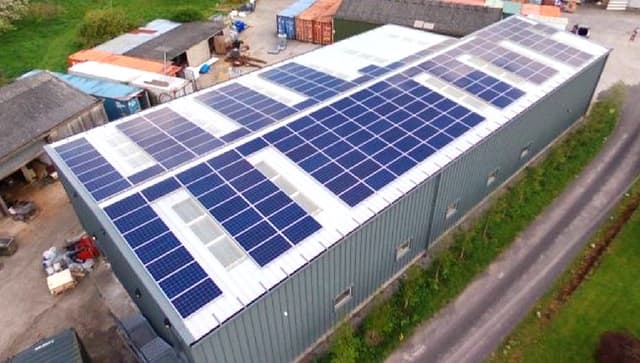Corporate PPA

Introduction to Solar PV
In an era marked by a growing concern for sustainable energy sources and environmental consciousness, solar photovoltaics (PV) have emerged as a revolutionary technology, harnessing the power of the sun to generate clean and renewable electricity. Solar PV is a cutting-edge technology that converts sunlight directly into electrical energy through the photovoltaic effect.
Why Solar PV
Cost Savings
One of the most compelling advantages of solar PV for businesses is the potential for significant cost savings. By generating electricity on-site, companies can reduce their reliance on traditional grid power, leading to lower energy bills. Over time, the initial investment in solar PV systems is often offset by reduced operating expenses, resulting in long-term financial gains.
Return on Investment (ROI)
While there is an upfront cost associated with installing solar PV systems, businesses can realize a favorable return on investment over the lifespan of the equipment. As technology improves and costs continue to decrease, the payback period for solar investments becomes more attractive.
Energy Independence
Solar PV allows businesses to generate their own electricity, providing a degree of energy independence. This independence is particularly valuable during periods of fluctuating energy prices or grid outages, ensuring a reliable and consistent power supply for essential operations.
Environmental Responsibility
Adopting solar PV aligns businesses with environmentally conscious practices, showcasing a commitment to sustainability. This can enhance a company’s corporate social responsibility (CSR) profile, appealing to environmentally conscious consumers and stakeholders.
Brand Image and Marketing Opportunities
Businesses that embrace solar energy can leverage their commitment to sustainability as a powerful marketing tool. Consumers increasingly prefer environmentally responsible companies, and showcasing a green initiative can positively impact brand image, customer loyalty, and market competitiveness.
Long-Term Stability
Solar PV systems typically have low maintenance requirements and come with long warranties. This contributes to the long-term stability of a business’s energy infrastructure, reducing the risk of unexpected disruptions and associated costs.
Increased Property Value
For businesses that own their facilities, installing solar PV systems can increase the property’s market value. Solar-equipped buildings are often seen as more attractive and forward-thinking, appealing to investors and potential buyers.
Employee Satisfaction
A commitment to sustainability, including the use of solar energy, can boost employee morale and satisfaction. Many individuals are drawn to environmentally responsible employers, and initiatives like solar PV installations contribute to a positive workplace culture.

In summary…
The integration of solar PV systems into business operations offers a range of benefits, encompassing financial savings, environmental responsibility, and enhanced corporate image. As solar technology continues to advance, these advantages are likely to become even more pronounced, making solar PV a compelling investment for businesses worldwide.
Power Purchase Agreement (PPA)
Power Purchase Agreements (PPAs) are contractual arrangements that enable businesses to procure electricity from an independent power producer (IPP) or a third-party solar developer without the need for upfront capital investment in solar infrastructure.
Here’s how PPAs typically work for businesses:
Agreement Structure:
- Term: PPAs generally have a long-term duration, often ranging from 10 to 25 years. The extended term allows businesses to secure a stable and predictable energy cost over an extended period.
- Fixed or Variable Pricing: The PPA outlines the pricing structure, which can be fixed, variable, or include a combination of both. Fixed pricing provides certainty, while variable pricing may be linked to market conditions or other predefined factors.
Project Development and Ownership:
- Third-Party Developer: A third-party solar developer designs, finances, installs, and operates the solar PV system on the business’s premises or a nearby location.
Ownership:
The third-party developer typically owns and maintains the solar infrastructure during the PPA term. The business, meanwhile, benefits from the generated electricity without owning the solar panels or incurring the upfront costs.
Electricity Supply:
- Generation: The solar PV system generates electricity, which is fed directly into the business’s facilities.
- Metering: The electricity generated is measured using metering equipment, and the business pays for the actual energy consumed from the solar panels.
Billing and Payments:
- Payment Structure: The business agrees to purchase the electricity generated by the solar system at an agreed-upon rate. Payments can be structured as a fixed rate or.
- Billing Mechanism: The billing mechanism may involve periodic invoices from the solar developer based on the amount of electricity consumed or a predetermined fixed payment.
Risk Mitigation:
- Maintenance: The responsibility for maintenance and repairs falls on the solar developer, reducing operational risks for the business.
End-of-Term Options:
- Purchase Option: At the end of the PPA term, businesses have the option to take ownership of the solar PV system at no cost. This can be an attractive option for businesses looking to take ownership and continue benefiting from low-cost electricity. Alternatively, the system can be removed at no cost to the business.
Legal and Regulatory Compliance:
- Legal Agreements: PPAs involve legally binding agreements between the business and the solar developer, outlining the rights, responsibilities, and terms of the arrangement.
- Regulatory Compliance: The PPA must comply with local regulations and utility agreements governing the sale and distribution of electricity.
PPA Summary:
By entering into a PPA, businesses can enjoy the advantages of renewable energy without the upfront costs and operational responsibilities associated with owning and maintaining a solar PV system. PPAs provide a flexible and cost-effective solution for businesses seeking to reduce their environmental impact while securing a stable and often competitive source of electricity over the long term.